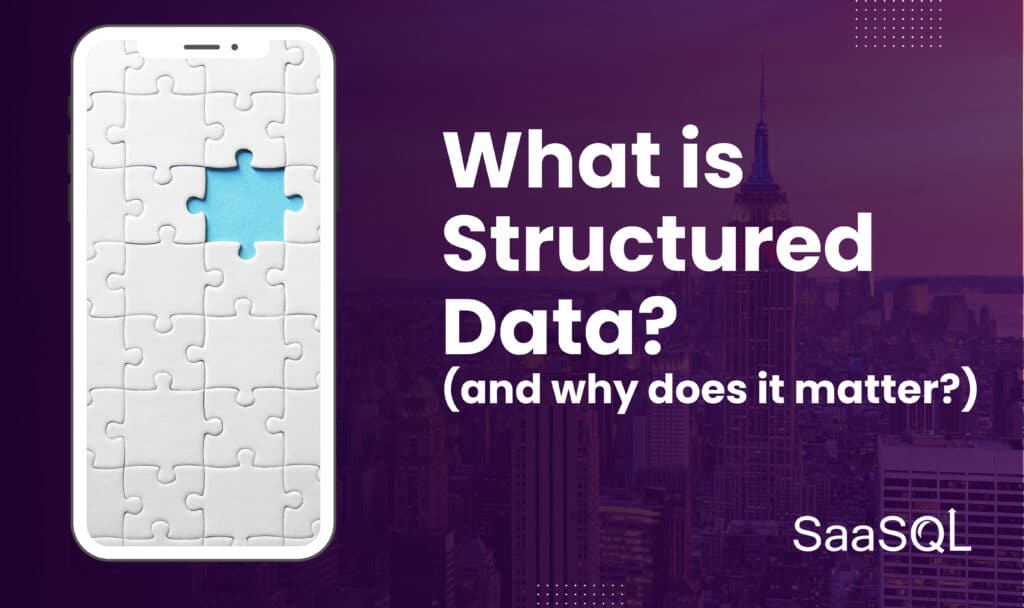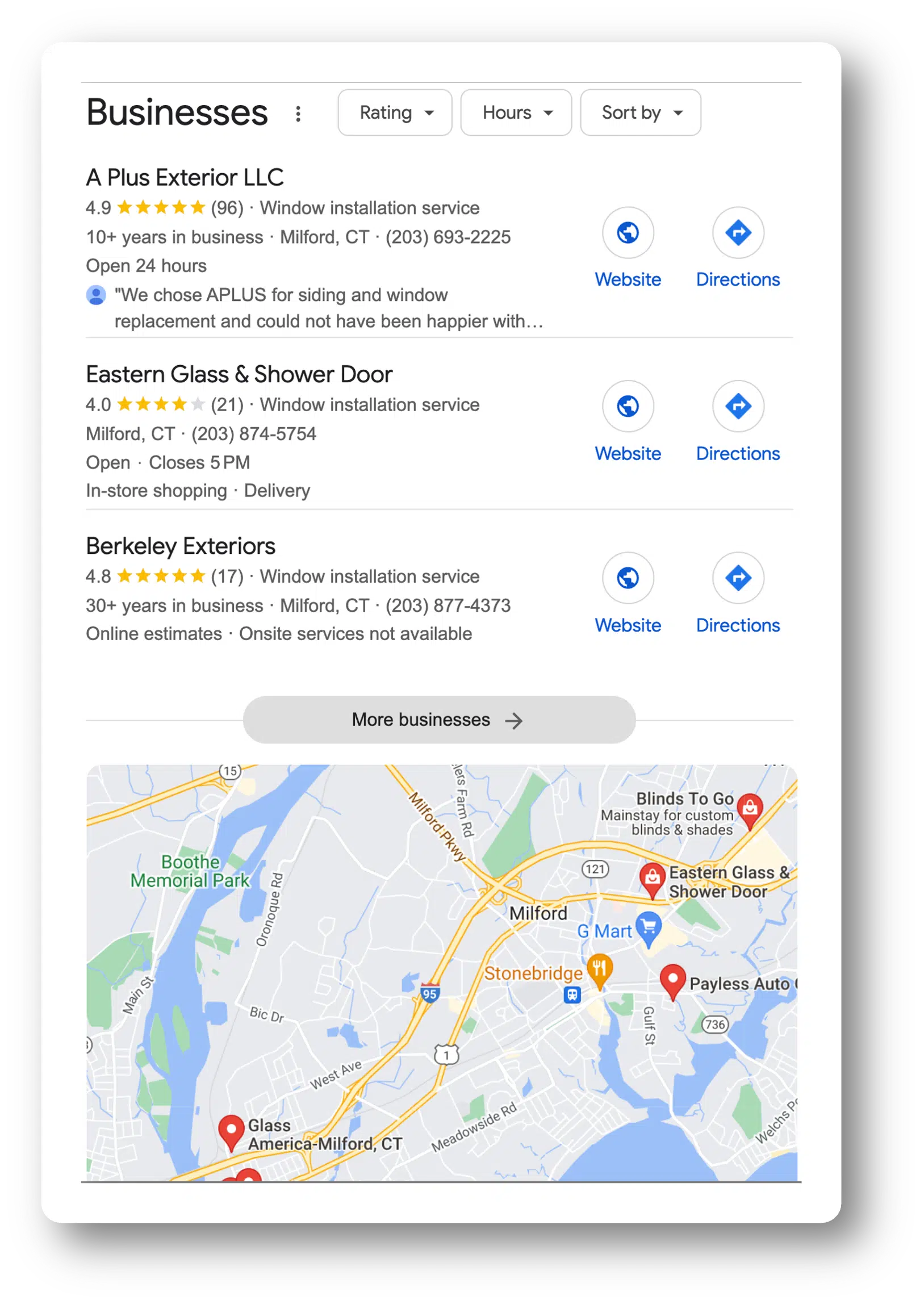What Is Structured Data and Why Does It Matter?
One of the most common questions we hear at SaaSQL is, “what is structured data?” To put it simply, structured data refers to a specific kind of code that gets added to your website to help search engines and AI tools understand your content. It works by labeling key information, like your business name, product prices, customer reviews, or operating hours so that machines know exactly what those details mean.
Think of structured data as labels on a package. Without the labels, a box might just look like a box. With labels, it’s clear that the box contains “fragile glassware” or “fresh produce.” Structured data works the same way, but for the content on your website.

This code follows a standard called schema markup, created by Google, Microsoft, Yahoo, and Yandex through their collaboration at schema.org. The markup uses simple, structured formats like JSON-LD to tell search engines what’s on your page.
Instead of guessing whether a string of numbers is a phone number, a product price, or a street address, structured data spells it out directly in the code. This helps Google, Bing, and AI tools like ChatGPT accurately understand and share the right details about your business.
For business owners, this means your content is more likely to show up when people search for the products, services, or answers you provide. Structured data isn’t about making your site look different to visitors—it’s about making your content readable and reliable for the machines that decide what gets shown.
How Does Structured Data Impact AI Search and SEO?
Structured data has always been important for SEO, but its role has become even more critical with the rise of AI-powered search tools like ChatGPT, Google SGE, and Bing Chat. These platforms aren’t just scanning content for keywords—they’re looking for organized, trustworthy information they can process efficiently. This is where structured data SEO becomes a competitive differentiator.
AI models don’t “rank” results the way traditional search engines do. Instead, they generate answers by pulling from a blend of structured signals, authoritative content, and factual context. The clearer and more structured your information is, the more likely it is to be chosen as part of an AI-generated response.
A recent study from BrightLocal highlights how AI engines are changing the game. While Google’s search results often lean on directory listings like Yelp or Angi, ChatGPT pulls nearly 58% of its local business recommendations directly from official business websites that use structured data. This shift means that structured data can often carry more weight than traditional backlink strategies when it comes to AI-driven discovery.
Structured data tells AI systems exactly what your business offers, where it’s located, what products you sell, and how people can contact you. It eliminates guesswork. This alignment with machine learning models makes structured data one of the most actionable AI SEO strategies available today.
The rise of “zero-click” answers—where AI delivers a solution without sending users to a website—further underscores the need to optimize structured data. If an AI engine can confidently pull your business details or service offerings directly from your schema markup, you increase your odds of being included in those high-value answer sets.
Schema markup has effectively become your way of speaking directly to the algorithms that decide whether your business will be mentioned or ignored. Without it, your content is just another unstructured page in a sea of information.
What Are the Most Important Schema Types for SEO and AI Visibility?
Schema markup works by tagging specific pieces of content so that machines can understand what those pieces mean. But not all schema types carry the same weight when it comes to improving your visibility in both traditional search and AI-generated answers.
The framework that defines these tags is found at schema.org, which catalogs hundreds of schema types. However, there are key categories that align directly with AI SEO strategies and should be prioritized by businesses looking to improve their discoverability.
LocalBusiness Schema
For any company with a physical location, the LocalBusiness schema is foundational. It communicates your business name, address, phone number (NAP), hours of operation, and location coordinates. This markup is often what powers Google’s local pack results and helps AI tools confidently recommend your business for “near me” searches.
Product Schema
For e-commerce brands, Product schema defines your product names, prices, availability, and reviews. This level of clarity improves the chances that your products will be surfaced accurately in both Google Shopping results and AI-powered product recommendations.
FAQ Schema
FAQ schema marks up question-and-answer content directly on your pages. With AI tools heavily favoring conversational answers, this markup allows your content to match the format that AI platforms use when generating responses. It also positions your content to appear in featured snippets within traditional search.
Article Schema
Content publishers benefit from Article schema, which identifies blog posts, news articles, and editorial content. It helps AI systems understand the nature of the content and supports features like rich snippets for headlines, images, and publication dates.
Event Schema
Event schema is essential for businesses that promote webinars, local events, or workshops. It tags event dates, times, locations, and ticket availability—making this information easier for AI models to surface in event-focused queries.
Review Schema
Review schema highlights customer reviews and ratings, which are critical signals of trust. Structured review data not only enhances visibility in Google’s rich results but also feeds the sentiment analysis that AI models often use to determine whether your business deserves to be recommended.
Prioritizing these schema types ensures that your content speaks the language of AI. When machines can confidently understand who you are, what you offer, and why it matters, they’re more likely to include your business in the answers your customers are already asking.
What’s the Best Way to Implement Structured Data for Maximum Impact?
While plugins can handle the basics, businesses serious about AI SEO strategies often need to move beyond plug-and-play solutions. Manual implementation of structured data using JSON-LD provides the most flexibility and control, ensuring that your schema accurately reflects your business and aligns with how AI models process information.
JSON-LD (JavaScript Object Notation for Linked Data) is the preferred format for structured data because it keeps your schema separate from the page’s HTML content. This makes the markup easier to manage, validate, and scale. It also helps avoid conflicts that can arise when multiple plugins or themes attempt to generate schema automatically.
How to Get Started with Manual Schema Implementation
- Identify which schema types are most relevant to your business (LocalBusiness, Product, FAQ, Review, etc.).
- Use the structured data generator tools available at schema.org to create your JSON-LD code snippets.
- Insert the generated code directly into the page’s header or body via your content management system or through your developer.
- Validate your markup using Google’s Rich Results Test and Schema.org’s Markup Validator.
When to Use Custom Development
If your business has complex needs—such as multi-location listings, dynamic pricing, event calendars, or bundled products—a developer should be involved to ensure the schema accurately reflects your data architecture. Custom implementations can also automate schema generation from your CMS or product database, reducing manual upkeep.
Tailoring Schema for AI SEO Strategies
The priority is not just passing validation but aligning your structured data with how AI models pull and synthesize information. This means:
- Prioritizing entity clarity: Is your business name consistent across all schema, content, and listings?
- Including detailed attributes: Are your product specs, business hours, and service areas fully described?
- Supporting conversational intent: Does your FAQ schema reflect the actual questions customers ask?
Schema markup isn’t simply about checking an SEO box—it’s about feeding clear, machine-readable signals to the platforms that now drive discovery. Taking the time to implement structured data properly increases your odds of being recognized, recommended, and trusted by AI-driven search tools.
Can WordPress Plugins Handle Structured Data for You?
For many businesses, WordPress plugins like Rank Math and Yoast SEO offer an easy entry point into structured data. These tools automate the process of generating schema markup, making it simple to add basic tags like LocalBusiness, Product, or FAQ without needing to write code.
Plugins can streamline the implementation process, especially for small websites or businesses just beginning their AI SEO strategies. They allow users to select schema types, fill out basic fields, and generate markup automatically across pages and posts. This level of automation reduces the risk of completely missing structured data opportunities.
However, while these plugins are helpful, they come with limitations that can directly impact your visibility in AI-powered search environments:
1. Limited Schema Coverage
Most plugins focus on core schema types but may not support niche or complex schema options. For businesses with specialized needs—like multi-location operations, detailed product variants, or event hierarchies—plugin-generated markup often falls short.
2. Lack of Customization
Plugins operate on templates, which means they often can’t handle edge cases where your business data needs more specific descriptors. For example, if your business hosts recurring events or sells bundles of products, plugins may not accurately represent these relationships in schema format.
3. Over-Reliance on Defaults
Many users install these plugins and rely entirely on their default settings. This can lead to incomplete or generic markup that doesn’t fully align with your actual content. In AI-driven search, where clarity and specificity improve your chances of being included in answer sets, half-implemented schema is often as ineffective as no schema at all.
4. Risk of Conflicting Markup
If your site uses multiple plugins or themes that each generate schema, it’s possible to end up with overlapping or conflicting markup. AI models and search engines may struggle to parse these inconsistencies, reducing the trustworthiness of your data.
While plugins provide a good starting point, the most successful structured data SEO strategies recognize their limits. For businesses aiming to lead in AI-driven discovery, manual optimization or custom development often becomes necessary to achieve full control and accuracy.
What Are the Most Common Structured Data Mistakes (and How Do You Avoid Them)?
Even well-intentioned structured data efforts can fail if implementation mistakes go unchecked. These errors not only limit your ability to appear in traditional search results—they also reduce your visibility within AI-generated answers. Effective AI SEO strategies depend on schema that is accurate, consistent, and aligned with your real-world business data.
1. Schema That Doesn’t Match Your On-Page Content
One of the most common issues is using schema markup that doesn’t reflect what’s actually on the page. For example, tagging a page with Product schema but not listing the product’s price or availability. AI models cross-reference schema with visible page content to assess reliability. When there’s a mismatch, your credibility drops.
2. Forgetting to Update Schema as Information Changes
If your business hours, product availability, or service details change and your schema markup isn’t updated, you’re sending conflicting signals to search engines and AI platforms. Outdated structured data can cause your content to be ignored or deprioritized.
3. Overloading Pages with Irrelevant Schema Types
It’s tempting to add multiple schema types to a single page, but irrelevant or unnecessary markup creates confusion. AI-driven discovery rewards specificity. Focus on the schema types that directly match the intent of the page.
4. Failing to Validate Your Schema
Skipping validation tools like Google’s Rich Results Test or the Schema.org Markup Validator leaves you blind to errors. Incorrect nesting, missing required fields, or syntax issues can all prevent your structured data from being processed correctly.
5. Inconsistent NAP Information Across Listings
For local businesses, structured data often includes Name, Address, and Phone number (NAP). If your schema says one thing, but your Google Business Profile or Yelp listing says another, AI models may distrust your data. Consistency across all platforms is critical.
How to Avoid These Mistakes
- Always align schema with on-page content.
- Schedule regular schema reviews whenever your business information changes.
- Stick to the most relevant schema types for each page.
- Use validation tools during initial setup and after every major website update.
- Audit your business listings across platforms to ensure consistent NAP data.
Avoiding these common pitfalls isn’t just about technical correctness. It’s about maximizing your chances of being surfaced by the AI systems your customers now trust to deliver accurate recommendations and answers.
How Does Structured Data Fit Into the Future of AI SEO?
Structured data has become a cornerstone of modern discovery in AI-driven search environments. The future of AI SEO strategies is moving beyond keyword tactics toward entity recognition, structured clarity, and factual precision.
Generative Engine Optimization (GEO)—the process of optimizing content for AI-powered search engines like Google SGE, ChatGPT, and Bing Chat—relies heavily on structured data. These systems prioritize clearly defined, trustworthy information that they can pull directly into their responses.
Google’s John Mueller has highlighted that structured data helps search engines understand relationships between content elements. In AI-driven search, where only a few answers are surfaced, this clarity determines whether your business is included or overlooked.
Structured data provides the machine-readable context that allows AI systems to recommend your product, service, or expertise with confidence. For businesses aiming to stay visible as AI reshapes search behavior, schema markup is no longer optional—it’s essential.
How Should Businesses Approach Structured Data Today?
Structured data is no longer just a technical best practice—it’s a core requirement for any brand that wants to stay competitive in an AI-driven search landscape. Whether the goal is to appear in Google’s rich results or to be surfaced by ChatGPT as a trusted recommendation, schema markup plays a decisive role.
The businesses that succeed will treat structured data as an ongoing process, not a one-time project. AI models favor sources that are clear, consistent, and current. That means your schema needs to be actively maintained and aligned with real-world business changes.
Action Plan for Structured Data Success:
- Audit: Review your existing schema implementation across all pages and identify gaps.
- Prioritize: Focus on the schema types that align with your core business goals—LocalBusiness, Product, FAQ, Review, Event, or Article.
- Validate: Use tools like Google’s Rich Results Test and Schema.org’s Validator to ensure your markup is correct and complete.
- Optimize: Customize your schema beyond plugin defaults. Make sure it reflects your actual products, services, and business details.
- Maintain: Revisit your structured data regularly. Update your schema whenever business information changes—hours, products, locations, pricing, or service offerings.
Structured data is a direct line of communication between your business and the systems deciding which brands get recommended. Treating it as a living, strategic asset—one that is tightly connected to your AI SEO strategies—positions your business to win attention in today’s evolving search environment. For a comprehensive guide to approaching AI SEO in a general sense read: Stop Guessing: The Definitive AI SEO Content Checklist
Frequently Asked Questions
1. What is structured data on a website?
Structured data is code added to a website that helps search engines and AI tools understand what the content means.
2. How does structured data improve SEO?
Structured data makes your website content machine-readable, increasing the chances of showing up in rich results and AI-generated answers.
3. Why is structured data important for AI search tools like ChatGPT?
AI tools prioritize clear, structured information when generating responses. Schema markup helps ensure your business details are included.
4. Do I need a developer to add structured data to my site?
While plugins can handle basic schema, working with a developer allows for full customization and better alignment with AI SEO strategies.
5. What are the most important types of structured data for local businesses?
LocalBusiness, Product, FAQ, Review, and Event schema are key for improving visibility in both traditional search and AI-powered recommendations.











